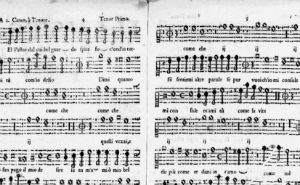
 HIS PAST week, which I spent in St, Paul, MN attending the annual CMAA Sacred Music Colloquium, was filled with many blessings. It was a week replete with academic keynotes to stimulate the mind, friendly conversations to strengthen the heart, and beautiful liturgies to move the soul.
HIS PAST week, which I spent in St, Paul, MN attending the annual CMAA Sacred Music Colloquium, was filled with many blessings. It was a week replete with academic keynotes to stimulate the mind, friendly conversations to strengthen the heart, and beautiful liturgies to move the soul.
Over lunch one day, I had a wonderful discussion with two other participants on the topic of music composition. Both of these musicians have degrees in composition, and one works actively as a full-time composer. So I took the opportunity to ask two questions that seemed worthwhile, even though I was fairly sure I knew the answers.
First, I asked if they compose using pencil and paper or a computer program. Predictably, they both said pencil and paper.
Second, I asked if they compose at a desk or at a keyboard. As you might expect, both said at their desks.
The discussion continued by observing how much the art of composition has changed in recent centuries. One of my lunchmates pointed out that the advent of computer software is perhaps not the biggest change composition has undergone since the medieval period. Arguably more significant is the adoption of the modern score. We are accustomed, in our time, to seeing full scores written out that include all vocal lines and instrumentation written out in measures that align vertically on the page. Until the 17th century or so, though, manuscripts were not written in this way. Compositions were, instead, written out for each individual part in separate “part books.”
This latter method is how such musicians as the 16th-century Palestrina would have composed. Can we even imagine the mental acumen that this style of composition necessitates? The sharpness of memory and breadth of vision this requires is certainly more demanding than what is required when composing in the fashion of a modern score. The effect of this practice upon the composer was undoubtedly a vivid appreciation for each musical line as a beautiful, integral whole.
Still more, it is worth considering that composers like Palestrina did not have CD collections or iTunes accounts. All their experiences of hearing sacred music, rather, were live performances. How different this is from our digital age, in which most musicians (and people generally) are inundated with recorded music.

Speaking of composition, one of my favorite parts of the colloquium each year is the new music breakout group. The idea is that composers (who range from hacks like me to rather polished artists) bring new pieces they are working on to be read through by the group, which usually includes 8 or 10 people. After sight-singing each piece, the members of the group offer feedback to each other. The composers use these constructive critiques to revise their manuscripts throughout the week, so that by the final day of the breakout, their work is either finished or at least improved. The final session is opened to all colloquium participants so that they can see and sing the revised compositions.
The annual Sacred Music Colloquium is a great opportunity to learn more about chant, polyphony, conducting, organ playing, etc. It is also a phenomenal venue for networking with other music directors, choir members, organists, clergy, etc. The colloquium draws together a wide array of people who love sacred music, and it has been known to forge new friendships.
Next year’s colloquium will be held at Loyola University in Chicago from June 25-30, 2018. If you have never attended a colloquium—or if you haven’t attended one in a while—plan ahead for next year.
